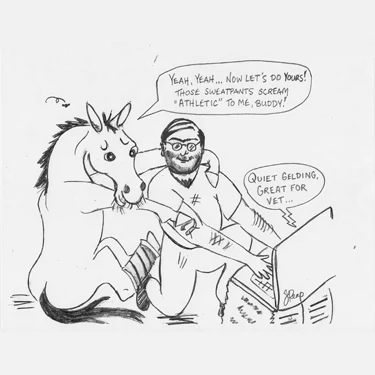When it came time to replace my previous mount … er, significant other, I did what came naturally after a couple of decades of buying and selling project horses: I got online, felt my way through the various sale websites, figured out my budget, wrote up a reasonable wish list, and started sending out inquiries. (Read Part 1 of the series, The Wish List.)
Which is when I discovered that the search platforms, with their clickable boxes for height, age and mad skillz, weren’t the only places where online dating feels an awful lot like horse shopping. For example:
Expect tire kickers.
Sometimes I’d be having a great conversation about a horse, get everything lined up for a visit, and poof. The seller disappeared. Maybe they got a better offer, maybe they had an emergency, second thoughts on the match, or an early case of seller’s remorse—it doesn’t really matter because they’re gone. If they even answered back in the first place, that is, because all too often when I asked for more info on a sale horse, all I heard back was crickets. So I moved on, looking for someone who wanted to do business with me.
I tried to take the same approach to online dating. Sure, it stung when I sent a message, saw the guy’s picture in my “Who’s been checking me out?” feed, and didn’t get a message back. But it also got uncomfortable when I sent a “Thanks, but not really what I’m looking for. Wishing you the best,” email and got a tirade back in response, telling me I wouldn’t know a top hunter prospect if it ran me over at the in-gate (so to speak). So, despite feeling bad about it, I eventually became one of those cricket people, figuring it was easier to say nothing than get into a debate over whether or not the sale video showed the dating version of a 2/5 lameness to the left—or worse.
But I figured that was part of the process. And, besides, the wince-inducing moments were counteracted by the “zing” that came when I got a lead on a likely prospect, and we started the pre-test-ride discussions in an effort to determine whether the candidate’s vices worked with my riding style and vice versa. As in horse sales, one or the other of us usually disappeared after a few messages, with or without an explanation. Sometimes, though, we progressed to discussing an actual date. And when it got to that point, I did exactly what I would do with a potential horse: I used the power of Google to see if I could confirm the things I was being told.
Buyer beware.
ADVERTISEMENT
These days, horse shoppers can verify show records, search email addresses, check out the sellers on message boards and social media, and hopefully get a sense of whether or not the seller is legit. Did the owner ask the armchair experts for suggestions on how to stop Dobbin from getting light in front? Next. A three-page blog post on the seller’s rehab protocol from the last time Dobbin tweaked his suspensory? Pass. Obviously, it was less telling if the horse wasn’t mentioned by name, but even a seller’s way of handling online discussions could raise red flags on whether I wanted to buy from them.
Similarly, when I reached the “make sure he’s not a serial killer” stage of things with a dating prospect, I hit the search engines to see what I could pull up with his name, email and phone number. In some cases it wasn’t much, either because his name was too common, or because he just didn’t have that much of an online presence. Others, though, gave me good data.
For example, Star Trek Fan (not his real username, just what I called him in my head) got the boot when I couldn’t connect him to the university where he claimed to be a professor, with strikes two and three being the pay-per-use cell phone and the invitation to meet him at a motel. And Cowboy Joe got the heave-ho when I discovered a whole lot of profanity-laden posts on a gaming bulletin board. Let’s just say, those quirks didn’t mesh with mine.
Beyond online searches, I read the emails carefully, making sure to stick my rose-colored glasses in a desk drawer. Just as I tended to avoid the horses whose owners repeatedly used words like “forward,” “sensitive” and “serviceable,” I weeded out most of the initial emails that contained things like “free-spirit,” “misunderstood” and “community service.” More, I asked questions and paid attention to what I got back. Because just as “He was high-point champion at his last show” isn’t an answer to “Has he ever colicked?” the old “You’ve got great eyes” isn’t a valid response to “Wait. Do you still live with your ex?”
Of course, there’s only so much that can be done online, and despite my having done my homework in both dating and horse shopping, there were always some surprises when it came time for that first face-to-face meeting.
Which leads us to next week’s third and final chapter: Horse Shopping vs. Online Dating: The Test Ride.
Author Jesse Hayworth’s years of horse-shopping stood her in good stead when online dating. Now married, she writes “quirky country comfort reads for romance lovers.”















